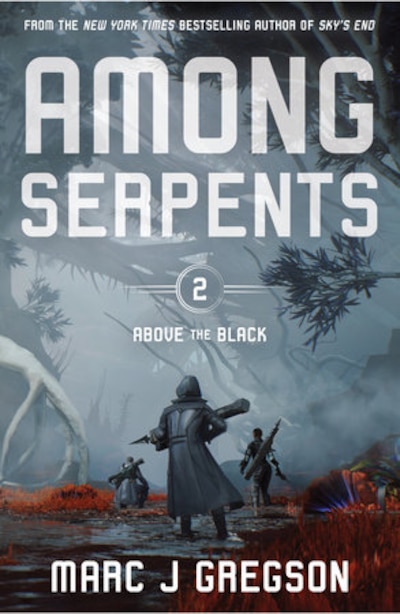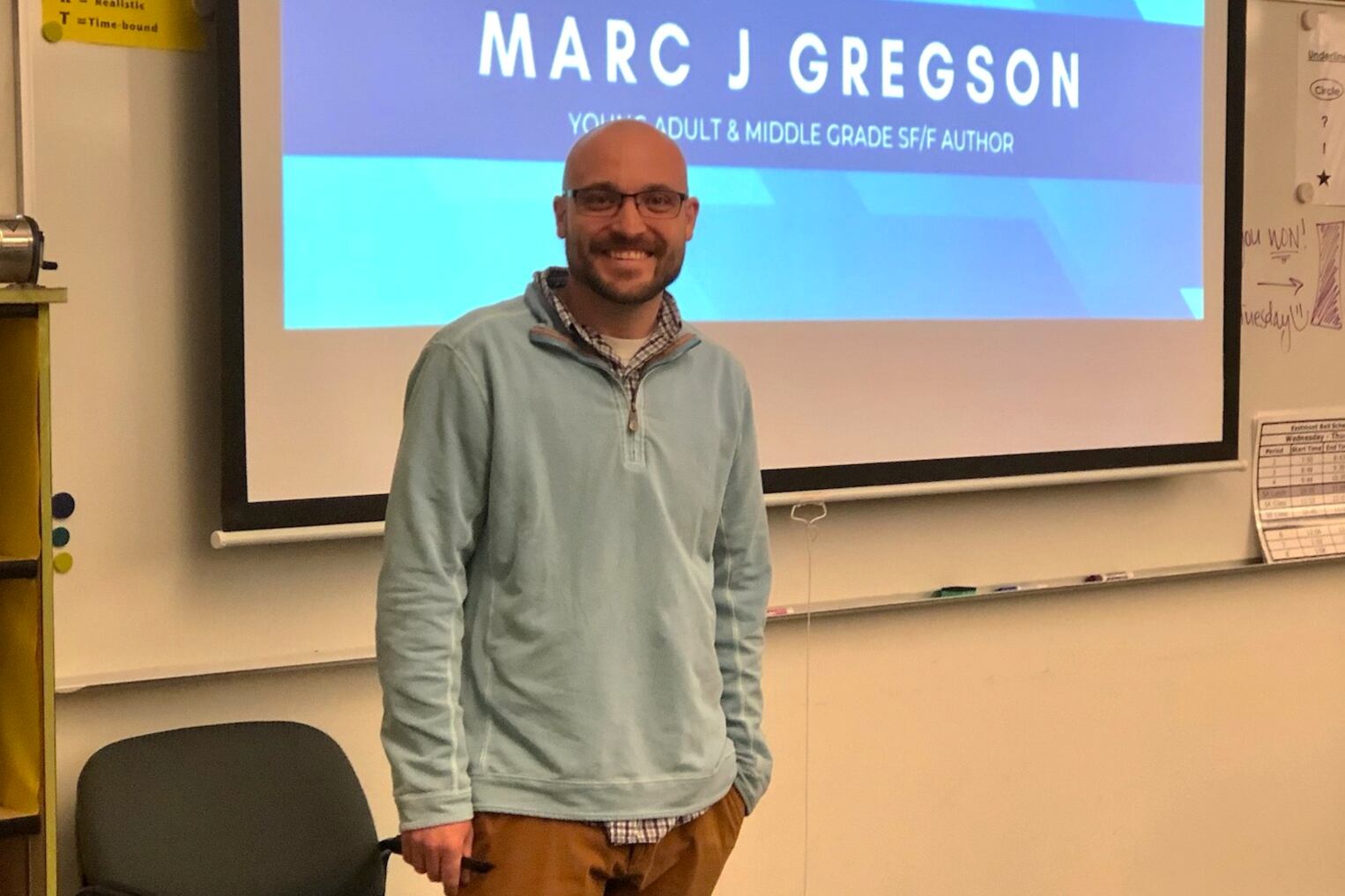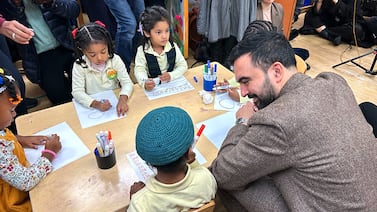Sign up for Chalkbeat’s free weekly newsletter to keep up with how education is changing across the U.S.
A husband, father, and middle school teacher, Marc J. Gregson had a lot on his plate even before adding a second career into the mix. He has taught English language arts at Eastmont Middle School in Sandy, Utah, for the past seven years. In 2024, his dark, dystopian debut novel “Sky’s End” was published to wide acclaim. “Sky’s End,” about a teen named Conrad who lives on an island floating above toxic clouds and under constant threat from sky serpents, made the New York Times Best Sellers list, and a film adaptation of the book is in the works.
Gregson’s second novel “Among Serpents” — part of his young adult trilogy “Above the Black” — hit bookstores this month. The educator and author recently spoke with Chalkbeat about balancing teaching and writing on deadline, the tearful moment that made him something of a social media star, and how he teaches students to find their voice and write without anxiety.
This interview has been lightly edited for length and clarity.

How and when did you decide to become a teacher?
In college, I planned on going into video game design, but I took some adolescent literature courses because I enjoyed them. The professor made us do a lot of public speaking. I was terrified of public speaking, but after I started presenting before the class, my professor pulled me aside and said, “You’re going to make an excellent teacher.” That perplexed me because, for one, I wasn’t taking the class to become a teacher, and, for two, I hated public speaking. However, her encouraging words put a spark in my head that only grew and grew.
And what compelled you to start writing fiction?
When I was in junior high, I was assigned a spooky Halloween short story project. I started writing a story about a killer squirrel that ripped people’s throats out and started the zombie apocalypse. Ha!
Surprisingly, I found myself getting excited about the class because, back then, I didn’t like writing — especially essays — but something about creative writing left me squirming with excitement. Every day, I hurried to class so we could go to the computer lab and I could continue working on the world I was creating. I discovered that writing was incredibly empowering, and my love for writing and fiction blossomed from there.
How do you teach writing to your students?
This year, we’re practicing generative writing, meaning that we do four-minute “quick writes” to start class on Mondays, Wednesdays, and Fridays. These generative writing sessions are not about quality, but quantity. I tell my students not to worry about grammar or punctuation. This takes the pressure off of them. Each quick write day, I give my students a variety of prompts, from finishing a story, their reaction to an image, or teaching me about something. I’ve found the more students get to practice writing without the pressure of being perfect, the more it helps them find their writer voice.
We also practice learning how to organize essays, including writing thesis statements, topic sentences, and how to elaborate on evidence. One of my favorite projects is our argumentative take-a-stand essays. Students get the freedom to self-select their topic and then create a six-paragraph essay including a counterargument. The topics they choose are always fascinating. I even received one essay where a student argued about which was the best airline!
You went viral when the cover art for your first book was unveiled in front of your students. It was an emotional moment — as the kids cheered, and you teared up. What were you feeling standing up there?
Honestly, it was really terrifying, and I was running on just a few hours of sleep because I was so anxious. When I went onto the stage and the whole school started the countdown, my heart really started hammering. What if I hated the cover?
When I saw the cover and Conrad with his harpoon launcher, everything became real. My book was real. I just lost it. The art was so dang cool! [Artist] Amir Zand did a tremendous job of creating “a living sky,” which is something I asked for, but he also created an image that showed just how big Conrad’s obstacles were in the book.
I’ve always been fascinated with dystopian stories. I’m intrigued by what happens when humanity must rebuild after a disaster.
Your books are dark and dystopian. What inspires these stories?
I’ve always been fascinated with dystopian stories. I’m intrigued by what happens when humanity must rebuild after a disaster. With “Sky’s End” and “Among Serpents,” I was inspired by the idea of an isolated sky. A world of floating islands, but I didn’t want a big mass of land visible beneath them. Only sky. So, I set out to discover why the islands were floating, why there were black clouds below them, and why there were giant monsters. I was also very interested to explore what kind of society would exist under the threat of these giant monsters and above toxic, black clouds.
Let’s talk logistics. How do you balance teaching and writing fiction? Any tips for writers who work a full-time job in another field?
This is tough. I’ve had to really be stringent with my scheduling because now as a published author with contracts, I have deadlines to meet. Plus, I never want to let anyone down with a poorly written book, so I need to dedicate as much time as I can to make my books the best I can.
Last school year, I worked full-time while being a husband and father and also launching my debut novel. I was teaching during the day, often doing author events on the weekends, and writing during the morning and evening. I was exhausted! Creating a routine really helped. I’d wake up at about 5:30 a.m., I’d write for an hour, then head to school at 6:30 a.m I’d try to get grading or lesson plans done before school started so I wouldn’t have to stay late in the building after school. Then, I’d eat an early dinner, and write until 7 or 8 p.m. This schedule was intense, but it let me spend some time with my children before they went to bed. This year, I went part-time teaching, so I come in during the afternoons. This has really helped me have a better work/life balance.
Here’s some advice for anyone pursuing traditional publishing: Set some soft deadlines for yourself, just to see how you handle working under those pressures, because once you’ve signed a contract, those deadlines get serious!
What lessons do you want your students to take from your publishing journey?
When I was getting close to landing an agent, I started telling my students about my journey as a writer trying to get published. I told my students about my rejections because I wanted to show them the power of perseverance. After I landed an agent, I got an email that changed my life while I was teaching seventh period. It was the offer for “Sky’s End.” I started crying, and my students were worried someone said something mean to me.
When I told them that “Sky’s End” was going to be published, the class erupted in cheers. Since then, I’ve visited the high school where many of those students are and they still remember the moment vividly. I hope that moment continues to stick with them while they’re chasing their own dreams.
What’s your vision for the movie adaptation of “Sky’s End,” which is now in the works?
I’m hopeful the film can capture the youthful toughness of Conrad, his duality of being caught between his parents, the horrific roars of the gorgantauns, and the robust personalities of the side characters. The book really played out like a movie in my head as I wrote it, and there are certain scenes in particular that stand out so vividly to me, so I cannot wait to see what the filmmakers cook up!
What’s the best advice you’ve ever received, and how have you put it into practice?
I try to follow the advice that you can’t please everyone. This is true in everything for me, from writing to teaching. For example, in my classroom, we have a fun testing review game I created called the Whiteboard Wars. It’s a huge hit, and kids are always excited to play it. My former students still talk about it. But there are always one or one or two students who groan. I’m pretty sure the only thing that would make them happy is if I had Minecraft loaded up for them! When it comes to writing, it helps me to look up the reviews of my favorite books by other authors. All of my favorite books have their fair share of one-star reviews. Those are great books, but again, you can’t please everyone.
Gabrielle Birkner is the features editor and fellowship director at Chalkbeat. Email her at gbirkner@chalkbeat.org.







